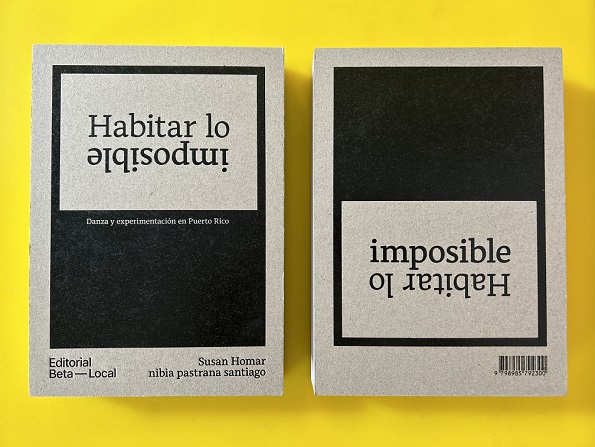El Adoquín Times writes that professor and dance critic Susan Homar and artist and choreographer Nibia Pastrana Santiago developed and edited Habitar lo imposible: danza y experimentación en Puerto Rico [Inhabiting the Impossible: Dance and Experimentation in Puerto Rico], the first book of its kind on the island, which covers four decades of experimental manifestations in Puerto Rican dance practice. [See information on how to obtain free copies of this book at the end of this post.]
The Puerto Rican Foundation for the Humanities (FPH), in collaboration with the cultural organization Beta-Local, announces the launch of the book Habitar lo imposible: danza y experimentación en Puerto Rico, developed and edited by professor and dance critic Susan Homar and by artist and choreographer Nibia Pastrana Santiago.
Designed by Alberto Rigau, this publication—with which Editorial Beta–Local makes its debut—studies four decades of experimental explorations in Puerto Rican dance from different perspectives: those of independent artists that make up this community and those of scholars of different fields that develop different analytical approaches and ways of writing about dance.
Through a collection of essays, artist statements, and interviews, the book proposes alternative ways of looking at and analyzing the development and contributions of experimentation in dance as a sustained practice that has always incorporated issues of gender, sexuality, race and our colonial situation. It is also the first time that a publication in Puerto Rico examines and analyzes a radically innovative aspect of the dance ecosystem.
“This is the culmination of a seven-year project motivated by the desire to recognize, record, analyze, and disseminate the dance movement and experimentation in Puerto Rico,” explained Susan Homar about this text, which was written for two voices and four hands.
The publication is aimed at a broad and diverse audience, according to Nibia Pastrana Santiago. “We wanted to produce an inter and transdisciplinary book that would show the ways of knowing and appreciating this dance, this art, and of correlating it with everyday reality, with other artistic forms, with political reflections of many kinds. That is why there are essays, artistic statements, interviews with the ‘teachers’ and a bibliographic section and research centers,” added the choreographer and dancer, referring to the text that recognizes the founders of experimental dance in the country (Petra Bravo, Merián Soto, Myrna Renaud, Awilda Sterling Duprey and Viveca Vázquez), as well as the artists who have followed.
Sonya Canetti Mirabal, executive director of the Puerto Rican Foundation for the Humanities, now Puerto Rico Humanities, expressed that it is an immense honor to present this book that comes to occupy a vital space within the artistic, cultural, and humanistic endeavors of our country. [. . .]
The publication includes archival photographs and images, as well as reproductions of programs, posters, scores, banners and single sheets that enrich the reading of the text, which has an equally experimental design. “Having a book with such a similar design, so well thought out, so beautiful is another motive for pride, thanks to the committed work of Alberto Rigau, who set out to understand this area of dance in Puerto Rico and to provoke with an equally ‘experimental’ design and to both pleasant and easy to read, as several friends and colleagues have told us,” Homar said.
The publishers announced at the official presentation of the book—which took place on March 4 at the Julia de Burgos Theater of the University of Puerto Rico, Río Piedras Campus—that the project will have an English version that will be published in November under the prestigious University of Michigan Press. That version in English, entitled Inhabiting the Impossible: Dance and Experimentation in Puerto Rico, has just been selected by the Studies in Dance: Theories and Practices collection, of the Association of Dance Studies, an international organization, as its publication of 2023.
Excerpts translated by Ivette Romero. For the original article, in Spanish, see https://eladoquintimes.com/2023/03/13/presentan-el-primer-libro-sobre-danza-y-experimentacion-en-puerto-rico/
Copies of the book may be obtained at the Fundación Puertorriqueña de las Humanidades, located on the third floor of the Cuartel de Ballajá [Ballajá Barracks] in Old San Juan, Puerto Rico.
To coordinate the collection of the book, you must call (787) 721-2087 or communicate via email at fphpr@fphpr.org.
You may also get it at Beta-Local by writing to info@betalocal.org. The publication is free of charge. If you are interested in supporting future publications like this one, you can make your donation to Editorial Beta-Local at the following link.


5 thoughts on “New Book on Dance: “Habitar lo imposible””